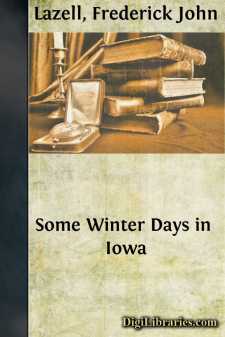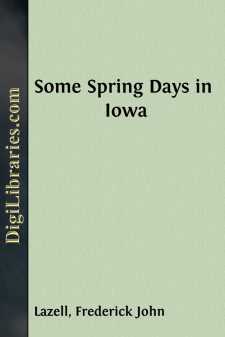Categories
- Antiques & Collectibles 13
- Architecture 36
- Art 48
- Bibles 22
- Biography & Autobiography 813
- Body, Mind & Spirit 142
- Business & Economics 28
- Children's Books 17
- Children's Fiction 14
- Computers 4
- Cooking 94
- Crafts & Hobbies 4
- Drama 346
- Education 46
- Family & Relationships 57
- Fiction 11829
- Games 19
- Gardening 17
- Health & Fitness 34
- History 1377
- House & Home 1
- Humor 147
- Juvenile Fiction 1873
- Juvenile Nonfiction 202
- Language Arts & Disciplines 88
- Law 16
- Literary Collections 686
- Literary Criticism 179
- Mathematics 13
- Medical 41
- Music 40
- Nature 179
- Non-Classifiable 1768
- Performing Arts 7
- Periodicals 1453
- Philosophy 64
- Photography 2
- Poetry 896
- Political Science 203
- Psychology 42
- Reference 154
- Religion 513
- Science 126
- Self-Help 84
- Social Science 81
- Sports & Recreation 34
- Study Aids 3
- Technology & Engineering 59
- Transportation 23
- Travel 463
- True Crime 29
Some Winter Days in Iowa
Description:
Excerpt
I. THE WOODLANDS IN JANUARY
Humanity has always turned to nature for relief from toil and strife. This was true of the old world; it is much more true of the new, especially in recent years. There is a growing interest in wild things and wild places. The benedicite of the Druid woods, always appreciated by the few, like Lowell, is coming to be understood by the many. There is an increasing desire to get away from the roar and rattle of the streets, away from even the prim formality of suburban avenues and artificial bits of landscape gardening into the panorama of woodland, field, and stream. Men with means are disposing of their palatial residences in the cities and moving to real homes in the country, where they can see the sunrise and the death of day, hear the rhythm of the rain and the murmur of the wind, and watch the unfolding of the first flowers of spring. Cities are purchasing large parks where the beauties of nature are merely accentuated, not marred. States and the nation are setting aside big tracts of wilderness where rock and rill, waterfall and cañon, mountain and marsh, shell-strewn beach and starry-blossomed brae, flowerful islets and wondrous wooded hills welcome the populace, soothe tired nerves and mend the mind and the morals. These are encouraging signs of the times. At last we are beginning to understand, with Emerson, that he who knows what sweets and virtues are in the ground, the waters, the plants, the heavens, and how to come at these enchantments, is the rich and royal man. It is as if some new prophet had arisen in the land, crying, "Ho, every one that is worn and weary, come ye to the woodlands; and he that hath no money let him feast upon those things which are really rich and abiding." While we are making New Year resolves let us resolve to spend less time with shams, more with realities; less with dogma, more with sermons in stones; less with erotic novels and baneful journals, more with the books in the running brooks; listening less readily to gossip and malice, more willingly to the tongues in trees; spending more pleasureful hours with the music of bird and breeze, rippling rivers, and laughing leaves; less time with cues and cards and colored comics, more with cloud and star, fish and field, and forest. "The cares that infest the day" shall fall like the burden from Christian's back as we watch the fleecy clouds or the silver stars mirrored in the waveless waters. We shall call the constellations by their names and become on speaking terms with the luring voices of the forest fairyland. We shall "thrill with the resurrection called spring," and steep our senses in the fragrance of its flowers; glory in the gushing life of summer, sigh at the sweet sorrows of autumn, and wax virile in winter's strength of storm and snow.
We shall begin our pilgrimages lacking in Nature's lore, many of us, as were four men who recently walked down a city street and looked at the trees which lined the way. One confessed ignorance as to their identity; another thought he knew but couldn't remember; a third said they looked like maples; and a fourth thought that silence, like honesty, as the copybooks used to tell us, was the best policy....




